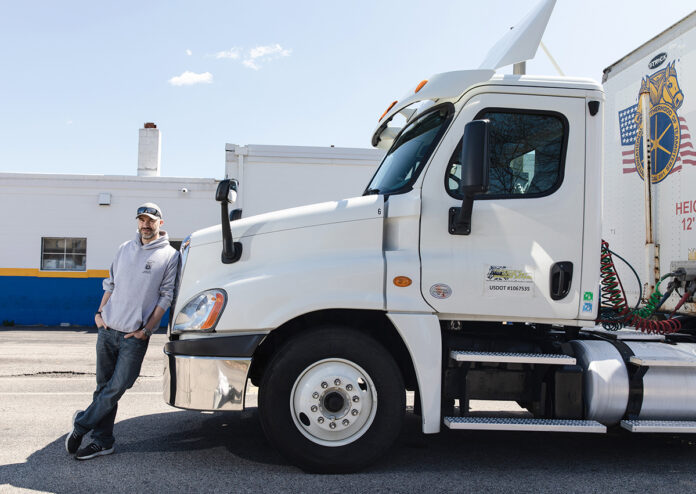You can’t learn to drive a tractor-trailer over Zoom.
Which is why the Teamsters Local 251 Driving School, which offers commercial driver’s license certification training through a partnership with Real Jobs Rhode Island, shut down the program in mid-March, according to Brian Palmer, the director of training for the Teamsters.
Palmer backed the decision to indefinitely suspend the program as a safety precaution – there’s no way to maintain social distancing in a 3-foot cab space, and many of the trainers fall in the high-risk category if infected by COVID-19 because of their older age. But it was a hard call to make, leaving more than 30 trainees unable to complete training and the 11 trainers furloughed until the coronavirus crisis subsides.
Also weighing heavily on Palmer’s mind is the future of the program, which relies on state funding that, given the current budget constraints, may not be a priority compared with other, more urgent spending needs.
Scott R. Jensen, the director of the R.I. Department of Labor and Training, which oversees Real Jobs RI, echoed the concern about the state’s ability to funnel money into the program. DLT has stopped approving new grants and adopted a “wait and see mode” regarding continued funding for existing programs.
‘If we come out of this ready to train people ... it’s an opportunity to grow quickly.’
SCOTT R. JENSEN, R.I Department of Labor and Training director
Expanding the state allocation for Real Jobs RI to $14.1 million was among the highlights touted by Gov. Gina M. Raimondo in the $10.2 billion fiscal 2021 budget proposal she unveiled in January. But an expected shortfall in revenue, coupled with increased expenses – including skyrocketing unemployment insurance claims – are sapping the state’s coffers.
Josh Block, a spokesman for the governor, said in an email that it was too early to tell how specific items included in the governor’s budget proposal will be affected by coronavirus-related constraints, adding that job training remains a priority but will need to be balanced with ensuring the state has the necessary revenue.
Participants in other Real Jobs RI programs have seen courses similarly halted, including those in the Shipbuilding/Marine Trades and Advanced Manufacturing Institute through the New England Institute of Technology. Like the driving school, the experiential, hands-on nature of learning welding, shipbuilding and computer numerical control made virtual learning impossible, according to Steven H. Kitchin, vice president for corporate education and training at NEIT.
He wasn’t overly concerned about funding, confident in the state and federal commitments to the program, as well as those by major employers such as Electric Boat Corp. He was more concerned about the 25 to 35 students whose coursework has been interrupted indefinitely and who might not be able to return once the program gets back up and running.
Kitchin expected demand for manufacturing and shipbuilding training programs to rise when the crisis abates, anticipating the supply-chain disruptions caused by the new coronavirus would spur some manufacturers to return operations to the U.S.
But first, the program has to survive what Kitchin described as a “break your neck kind of stoppage in the economy.”
While truckers and manufacturers have largely continued operations, the hospitality industry – a central part of the state economy – ground to a halt almost overnight as hotels and restaurants went dark.
The Rhode Island Hospitality Association has been hard at work not only raising money for industry workers but also retooling its own workforce-training programs to serve a now largely unemployed workforce that might be looking to fill some newfound free time with a certification or training course.
“My phone is ringing nonstop with a lot of people saying, ‘I’m ready to take my exam,’ ” said Heather Singleton, the association’s chief operating officer. “I am a firm believer that if you have any down time, let’s do something to keep the brain going and be prepared so you can jump back in.”
After initially postponing most of its Real Jobs RI training programs, RIHA has shifted to almost entirely virtual training, including an updated food-safety course related to protocol around takeout and delivery and COVID-19. Singleton also anticipated the association would come up with new training courses sparked by the coronavirus, naming a mental health education class as one possibility.
While acknowledging that workforce training has fallen further down the funding priority list, Jensen also noted that Real Jobs RI could be a vital part of helping the state economy recover when the worst of the crisis is over.
“If we come out of this ready to train people into the right kinds of positions relative to our economic strengths, it’s an opportunity to grow quickly,” he said.
Charles Beausejour, a retired truck driver and trainer for the Teamsters Local 251, also spoke to how the crisis has underscored the importance of workforce training, particularly for the trucking industry.
“We always say, America moves by truck,” he said. “The masks, the food on the shelves of the supermarket, it’s not magic that moves it there. It’s truckers.”
Nancy Lavin is a PBN staff writer. Contact her at Lavin@PBN.com.












